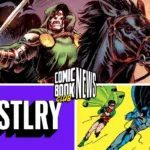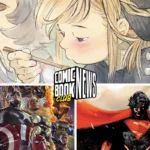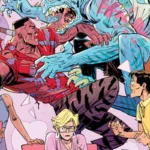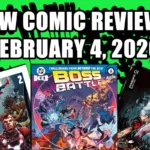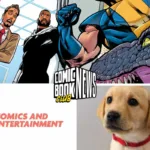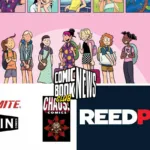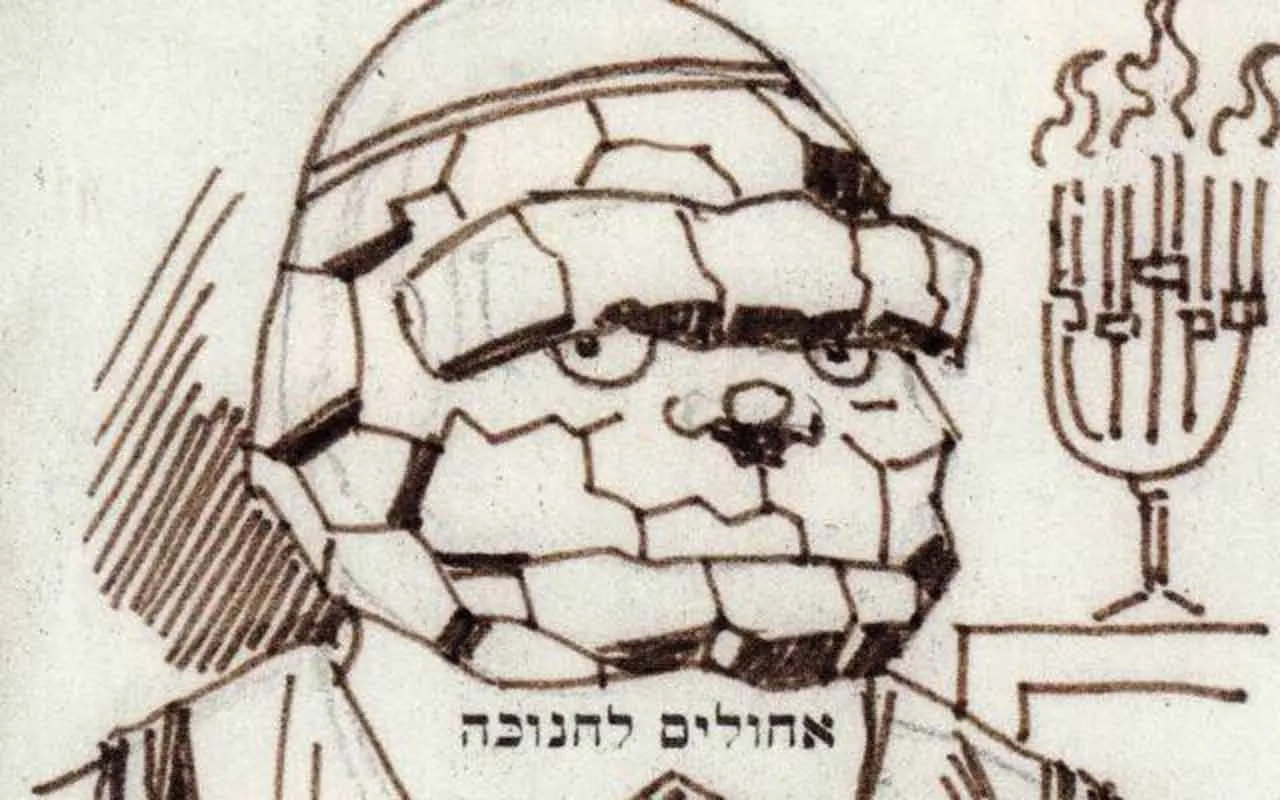The concept of the golem in Jewish mysticism is one that repeatedly inspired comic book creator Jack Kirby throughout his career. It is a concept of profound importance within Jewish folklore, and Steve Rogers — aka, Captain America — is Kirby and Joe Simon’s too-perfect first attempt to bring that folklore to life in American pop culture. Ben Grimm, the Fantastic Four‘s The Thing, on the other hand, is a golem baked in the furnace of Kirby’s experience in World War II.
The golem as a concept is incredibly important in Jewish mysticism, particularly among Eastern European immigrant communities of the early 20th century. And as a first-generation Jewish American growing up in New York, Kirby grew up deeply steeped in Jewish folklore and tradition.
Though the word “golem” appears only once in the Torah itself, Talmudic and Kabbalistic writings elevate the idea from a metaphor to a force with profound mystical power. While the golem in Psalms is a literal expression of an “unformed substance,” folk tales like “The Golem of Prague” embedded within Jewish immigrant culture the idea of a mystical protector, made of raw clay and imbued with life by a human practitioner known as a “tzaddik,” or “righteous one.” The golem in this tradition is a soulless beast, brought to life by spoken or written words of power. That concept of words as creative and destructive forces with the ability to shape the material world would inform and shape Kirby’s creations until the end of his life.
Kirby would spend much of his comic-creating career exploring the ideas of power words and golems, and he began with Captain America. Steve Rogers is Kirby’s imperfect first attempt, representative of his pre-war idealism and faith. As a young creator and a vocal opponent of fascism, Kirby set out (with co-creator Joe Simon) to shape and release into the world a patriotic golem for the ages.
Steve Rogers is the everyman empty vessel, with the added twist that his physical presentation perfectly mirrors and subverts the German fascists’ eugenics-based philosophy of an “aryan master race.” The raw clay of Steve Rogers’ blonde hair and blue-eyed features are useless on his sickly frame until he’s remade by Project Rebirth.
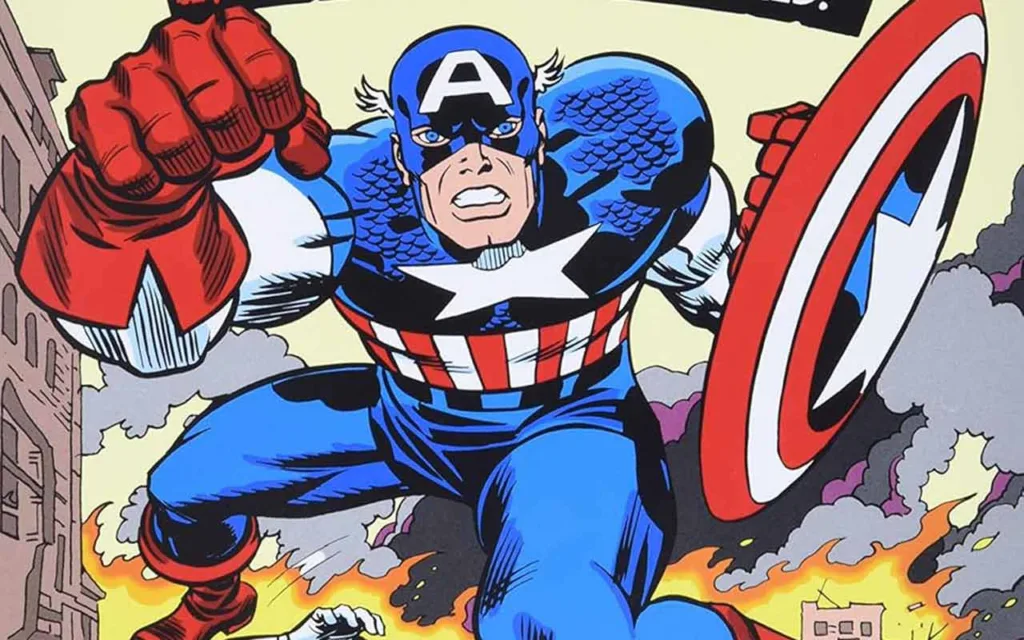
He is an expression of the belief that the genius of Jewish scientists, combined with the willing bodies of the average American, would carry the day. Scientist Abraham Erskine is to the creation of Cap as a golem to win the war as Albert Einstein was to the creation of the atom bomb: they were both German-Jewish scientists who fled the anti-semitic regime and offered their genius in the service of democracy.
As the product of an intentional process meant to create him, Steve represents the belief that humanity’s own agency is how victory is won. He was well-suited to the purpose for which he was made. Steve Rogers was shaped and released into the public consciousness to build the case against fascism and the case for American intervention on behalf of what much of the American public saw as a principally Jewish cause. Kirby and Simon were subject to harassment campaigns by members of the American Bund, an American pro-German, pro-fascist political and street action group. In 1941, shortly after the release of Captain America, several members of the Bund paid a visit to the offices of Timely Comics, where Kirby and Simon worked on the book. When the desk attendant phoned up, Kirby famously rolled up his sleeves, balled up his fists, and headed down to greet them. The Bund members had fled by the time Kirby arrived, but the creator was well-known for his stance being, “The only real politics I knew was that if a guy liked Hitler, I’d beat the stuffing out of him and that would be it.”
Steve Rogers embodies Kirby and Simon’s youthful optimism and faith in the power of collective thoughts and prayers. Ben Grimm, though, shows what the war did to Jack Kirby. Ben Grimm is Kirby’s refined vision of the golem, imbued with Kirby’s own aspect and affect, and explicitly anti-fascist. If Steve Rogers is the hero of young Kirby’s dreams, Ben Grimm is the golem of his post-war nightmares.
Where Steve Rogers represented Kirby and Simon’s ideal “empty vessel”, within which they pulled an Uno-reverse of Hitler’s “aryan master race” ideology, Ben Grimm is explicitly Jewish and made to mirror the Kabbalistic mysticism which had captured the older Kirby’s attention.

Ben Grimm’s Judaism is often and explicitly presented in the pages of Fantastic Four comics as well as in the most recent screen adaptation, which features Jewish actor Ebon Moss-Bachrach in the role. And not only that, Moss-Bachrach’s casting marks the first time in five live-action appearances that a Jewish actor has played the role of The Thing.
It is readily apparent how Kirby’s role and experience as a soldier and cavalry scout in World War II shaped his creative instincts and the character of Ben Grimm. Both Ben and his best friend Reed Richards are veterans of the Army Air Corps (the precursor to the US Air Force) and explicitly anti-fascist. The motifs and geographic vicinity of the FF’s archenemy, Doctor Doom, are heavily Germanic-coded. Doom’s totalitarian grip on his people (despite the trains in Latveria always running on time and children always getting a good night’s sleep) is explicitly fascist and echoes the German regime during World War II.
The creation of the golem (Grimm) illustrates how Kirby’s faith in human agency had waned in his post-war phase. Where Steve Rogers’s golem presentation showed science and agency as the tools of salvation, in Fantastic Four, it is the voice of god as embodied in “cosmic background radiation” which defies even the well-meaning technology of man. He is the product of his best friend’s errant genius, rather than an enemy’s suborned science, a la Steve Rogers and Dr. Erskine.
Ben’s reluctant and painful embrace of his protector role speaks to the identity crisis of the nuclear age. Humanity was possessed of the literal power of the gods, but that power hung over the world of Kirby’s time like the Sword of Damocles. Where the classical golem embodied by Steve serves as the perfect vessel for an unrepentant patriotism driven by science, the modern golem embodied by Ben questions whether he has the wisdom and fortitude to serve humanity despite his monstrosity.
Kirby explored the idea of the golem through his characters for almost his entire career. The idea of creation being a function of knowable words of power would permeate his work at Marvel, and later inspire his retelling of the Book of Genesis as science fiction (but that’s an article for another time). Jewish folklore resonated throughout Kirby’s work, inspiring the characters of Steve Rogers and Ben Grimm. Ben shows us what the war did to Kirby and how he used his art to understand and express his experience.
If Steve believed that a science-power shield of idealism could win the day, Ben knew that you have to listen to the voice of god — and know when it’s clobberin’ time.
Comic Book Club Live Info:
Discover more from Comic Book Club
Subscribe to get the latest posts sent to your email.
